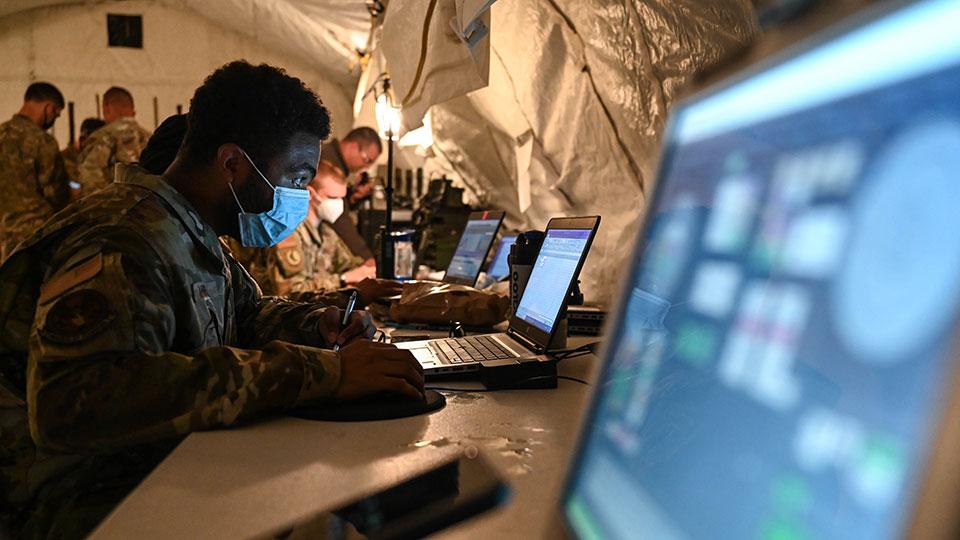Meeting the Mission: Rapid Acquisition of Advanced Technology Through Small Business Innovative Research
Expediting the acquisition of innovative technology through the Small Business Innovative Research (SBIR)

The Tetra Tech Federal IT Group supports federal agencies, including the Department of Defense (DoD), in accelerating solutioning on priority challenges through the Small Business Innovative Research (SBIR) program, which expedites the acquisition process to obtain innovative technology and new capability at lightning speeds.
The SBIR program is specifically designed to support the rapid acquisition of advanced technology into the hands of military services. In alignment with Tetra Tech’s Leading with Science® approach, the SBIR vehicle is designed to stimulate and foster scientific and technological innovation while increasing commercialization of federal research and development.
How does the SBIR program work?
A key goal of the SBIR program is to fund and reward innovation, and this requires a rapid and agile approach to contracting, which is not typical in other parts of the federal procurement world. The SBIR program achieves this through a three-phase award process, enabling them to effectively address requirements, award quickly, assure value, and then follow through with a larger investment:
- Phase I is awarded to U.S.-based small businesses with SBIR Research/Research & Development (R/R&D) funds with the objective to establish the technical feasibility, scientific merit, and potential of a proposed R&D effort
- Phase II is awarded with SBIR R/R&D funds to Phase I SBIR holders to build-out, prototype, and test efforts defined in a Phase I SBIR
- Phase III is awarded to any Phase I or II SBIR awardee any time after a Phase I award for the purpose of leveraging the effort defined, prototyped, and tested in the previous phases
A Phase III SBIR allows the government to achieve a great return on Phase I and II investments, as it enables organizations with a similar challenge to go straight to the solution provider and issue a direct award contract. Phase III awards do not use SBIR R/R&D funds.
To further streamline the procurement process, the SBIR program enables a direct sole-source contract for Phase III awards. This approach leverages the competitively sourced Phase I and II awards and provides new solutions to meet federal programs’ needs. Awarding a Phase III SBIR is a simplified acquisition approach that accelerates the time from need to solution and reduces costs compared to other procurement approaches. A sole-source award can be made in a matter of months or even weeks. An issuance of a Phase I and Phase II SBIR is considered a competitive-based award, satisfying the requirement for competition. This makes Phase III contracts highly attractive.
Tetra Tech Federal IT Group’s SBIR for modernizing and migrating legacy systems to the cloud
Segue Technologies, part of the Tetra Tech Federal IT Group, was awarded an SBIR to modernize and migrate legacy systems to the cloud using their suite of system engineering practices, the unique Segue Process Framework (SPF), and a leading no/low code development platform that provides advanced capabilities. These capabilities included analytics, machine learning (ML), artificial intelligence (AI), and robotic and digital process automation. Since cloud migration is a key driver in legacy system sustainment and modernization efforts, the SBIR provides the process, platform, and agile methodology critical to its success.
Tetra Tech’s Phase I and Phase II SBIR projects consisted of assessing and choosing a no/low code development platform, and then prototyping a selected legacy system capability in that platform to demonstrate migrating the capability vs. the system. Following an Agile engineering approach, Tetra Tech worked with an Air Force organization to identify a specific set of business capabilities and developed a prototype to successfully support those processes. The solution addressed important considerations for advancing the no/low code platform into an operational environment and included reusable component architecture, software code reuse, and seamless acceptance and support of solutions developed by another organization. The approach proven via Phase I and II can now be applied to any other organization that participates in the SBIR program through a Phase III award, as it would be an extension of that initial investment.
The efficiency of the SBIR contracting approach leverages the competitively sourced Phase I and II awards and provides new solutions to meet federal programs’ needs quickly. This makes Phase III contracts highly attractive, and the impact of Tetra Tech’s solution is quickly felt, leading to timely delivery and a satisfied client.
U.S. Air Force photo by Senior Airman Sarah Dow

